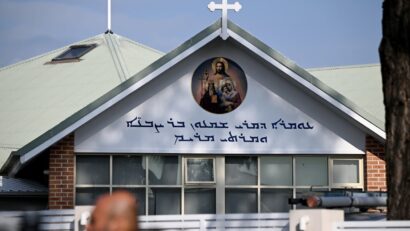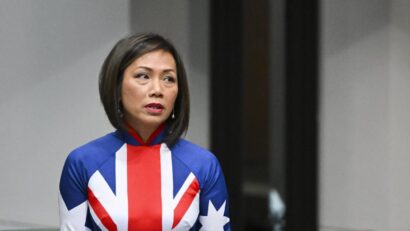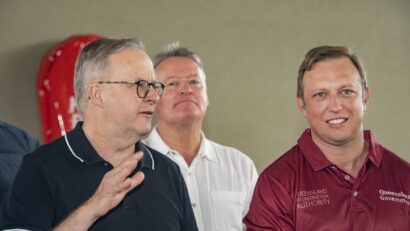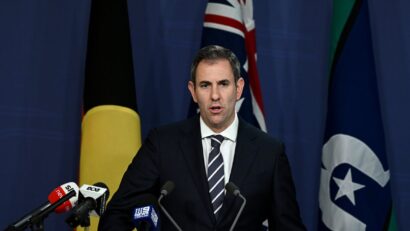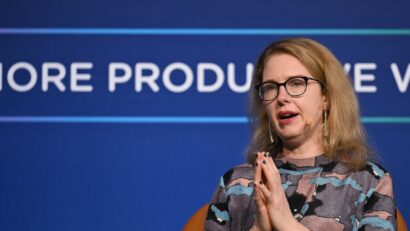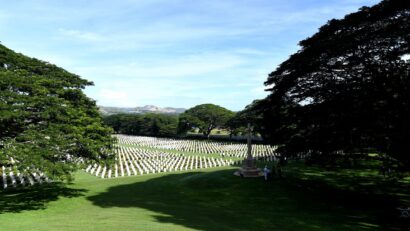
View from The Hill: Albanese to walk Kokoda track and engage in some jungle diplomacy
Anthony Albanese will trek the Kokoda track on Tuesday and Wednesday, before attending the Anzac Day Dawn Service at the Isurava memorial site that commemorates one of the toughest battles the Australians fought in the second world war.
The trek is a favourite with politicians, more often made as they scramble up the political ladder. Kevin Rudd and Joe Hockey famously walked together in 2006, with Hockey ever after boasting of how he fished the future PM out when he’d slipped crossing a stream.
Apart from the deep historic symbolism, Albanese’s trek involves some jungle diplomacy, part of the Prime Minister’s continuing efforts to reinforce Australia’s ties with its close northern neighbour.
Marape plans to join Albanese on the trek, and will be at Thursday’s dawn service. The two leaders will already have had a meeting before the gruelling walk starts.
Apart from the long historical, geographic and political ties between the two countries, PNG, a nation beset with economic, tribal and social problems, has become increasingly important in the battle between China and Australia for influence in the Pacific. Australia signed a security and policing agreement with PNG last year.
Chinese Foreign Minister Wang Yi was in PNG at the weekend, when, in a remark seen as a crack at Australia, he told the media that Pacific Island countries “are not the backyard of any major country”.
Wang also took a swipe at AUKUS, saying that the partnership threatened regional peace and security. “Instigating division is not in line with the urgent needs of Pacific Island countries,” he said.
Albanese has met Marape frequently and the two leaders have addressed each other’s parliament. In his address in February Marape said the bilateral security agreement reflected the focus on PNG becoming a strong, economically resilient nation.
“A strong, economically empowered Papua New Guinea means a stronger and more secure Australia and Pacific,” he said.
Ian Kemish, high commissioner in PNG from 2010-2013, who is Distinguished Adviser at the Australian National University’s National Security College, says “it’s significant Albanese is visiting for several days and is spending so much time with Marape”.
Kemish says Australia is in a stronger position in PNG than in some other parts of the Pacific, because of the very broadly-based bilateral relationship.
“It’s not all government-to-government,” he says. There are extensive economic and trading links, links through development aid, and cultural links. (On the sports front, the federal government strongly backs PNG’s bid become a National Rugby League team 2027, on which talks continue.)
Kemish says China has had “a few runs at Papua New Guinea”, but these have amounted to very little at the political or strategic level.
But China has moved in significantly at the commercial level, in construction including building roads and bridges.
“While there is not a lot of vulnerability [to China] at the national political level, there are opportunities for China at the provincial level, where it can do economic and resource deals and convert them into strategic opportunity over time – for example if China engaged with a frustrated Bougainville. The regions are frustrated with the centre,” Kemish says.
The Kokoda campaign ran from July to November 1942, and involved some 56,000 Australians, of whom about 625 wre killed and more than 1600 wounded along the track.
Albanese said at the weekend: “The Kakoda campaign and the Kokoda track form part of our national identity, a defining chapter in the story of those who risked and lost their lives in defence of Australia and in our shared history with Papua New Guinea.
”Kokoda is a name that lives in Australian legend. It captures the spirit of courage, endurance, mateship and sacrifice forged between Australia and Papua New Guinea during world war two.
”Participating in this walk is a solemn way to honour, to reflect on the sacrifices made by those who walked this same ground, people from Papua New Guinea and Australia, serving and sacrificing together in defence of their home.”
The trip will yield plenty of pictures but probably none so striking as when in 1992, PM Paul Keating fell to his knees and kissed the ground at the Kokoda Monument. As Don Watson, historian and Keating’s speechwriter, later wrote, “Even by Keating’s standards it was a remarkable act”. Läs mer…
